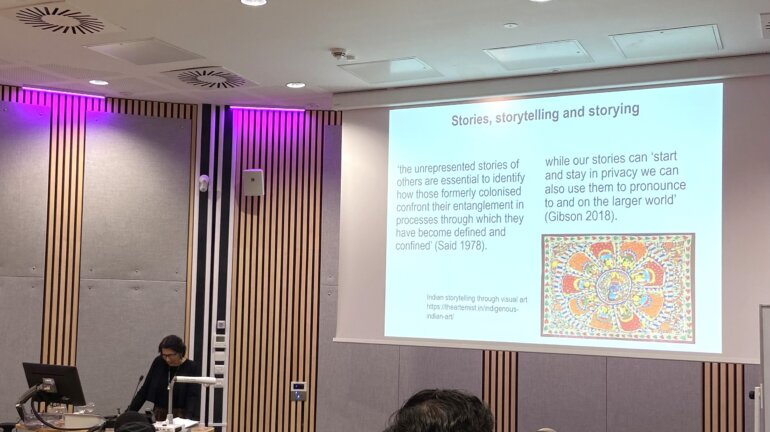Spotlight on IGDC York
Public good
The University of York exists as a university for the Public Good, with a strong social purpose, a tradition of social justice and tackling inequality. This strategic focus gave the Politics, Environment, Geography and History researchers at York a strong impetus to bring their work together to form the Interdisciplinary Global Development Centre.
The Interdisciplinary Global Development Centre understands global development as the practices, policies and possibilities that encompass worldwide socio-economic and environmental transformation. The IGDC see their work as relevant to all countries and contexts. “It’s really important to emphasise our positionality in relation to global development. Our attention is to the actions and dynamics in developed or rich countries as much as it is in middle and lower income countries. We’re interested in interconnectivity and understanding development as a global project rather than one that only takes place in “developing countries”,” explains Centre Director, Professor Jon Ensor.
Bringing people together
IGDC’s approach recognises that global development is most effectively addressed by working across academic disciplines. The IGDC is a member-led centre, where the members are academic and research staff across the university.
“We are here to bring together those academics and researchers who are from different disciplinary backgrounds or all kinds of training and traditions, to enable conversations between them and to ensure that we’re delivering something that’s greater than the sum of the parts”, explains Jon Ensor. “We’re here to support and enable the work of academics who are situated across the departments within the university. For example, in the natural sciences, there are people who work on or within the global development space, but wouldn’t naturally align themselves or consider themselves to be part of a global development community. To be able to invite them in and open a space in which they can think more broadly about the work is a very positive contribution,” adds Ensor.
“One of our key priorities going forward is to strengthen linkages between researchers in the social sciences and our colleagues in natural sciences that are working on themes relevant to global development. We want to create events where we can foster intellectual exchange across disciplines, and bring together people to talk and collaborate,” describes Dr Saba Joshi, the Centre’s Deputy Director.
Motivating engagement
The Centre’s central purpose is to support, catalyse and enable the emergence of research ideas, networks, partnerships and proposals. IGDC undertakes a number of activities and identifies networks and partnerships between academics that might not otherwise be thinking and talking together, as well as partnerships with other universities or with other organisations.

The Centre runs seminars, workshops, an annual lecture, and provides postgraduate support across the disciplines, as well as convening workshops in relation to funding calls. IGDC has found that bringing people together and facilitating conversations around idea generation leads to relationship-building and ultimately proposal development. Formal events are built to have informal spaces where relationships can emerge. Skills development is also offered as something that attracts people across disciplines. Dissemination of work is supported by a cross disciplinary blog and newsletter, and the Centre is keen to explore podcasts.
“Funding for research nowadays can require a strong emphasis on interdisciplinary working. By building relationships with the Centre, researchers are able to build an evidence-based, convincing interdisciplinary story.”
Teaching and early career research support
One legacy of the IGDC is the creation of the University of York’s BA in global development and a PhD in global development programme in 2020. In 2024, the University of York will launch a new MA programme in Global Development Politics, based in the Department of Politics and International Relations.
The BA is based on a problem-based learning model, which is innovative and consists of student-led seminars, with students taking the initiative in their own learning based on practical, “real world” problems.
IGDC has a network of postgraduate students and PhD candidates in global development, who are officially housed in the politics department. Postgrads are networked and have led initiatives, including a seminar series, and are supported in activities such as career development.
PhD students who aren’t in global development, but whose research connects to global development, become members of the centre, expanding the post-grad network.
Partnerships
The Centre also convenes and coalesces around several partnerships, one of which is the Federal University of Bahia (UFBA) in Brazil and their Institute for Collective Health. Following workshops and presentations in both countries, common themes were identified for further work and papers: decolonising development and participatory research methods and using arts-based methods in relations to human rights and development research.
IGDC is currently working in partnership with UFBA researchers to develop a podcast series on decolonizing global development. The series focuses on principles of decolonial research partnerships, methodologies and experiences of researchers at York and UFBA, with the aim of capturing knowledge exchange in a more fluid and accessible format for audiences within the University and beyond
The Centre is also working with the University of Pretoria’s Centre for Asia in Africa to co-create a virtual seminar series on the topic of land and resource struggles in Asia and Africa.
“These sorts of events can become the foundation stones for partnerships down the road. We’re like a hub and spoke model, that emphasises the value of an organic, fluid structure that allows for the emergence of ideas from across the university, rather than a formalised centre.”
Find out more and connect with IGDC York
The Interdisciplinary Global Development Centre is an interdisciplinary centre for research and a partnership for global development based at the University of York. It is led by the Departments of Politics and International Relations, Environment and Geography, and History, and works with partners across and beyond the University to develop innovative interdisciplinary people-focused solutions to address the urgent and structural challenges of global development.
Website https://www.york.ac.uk/igdc
